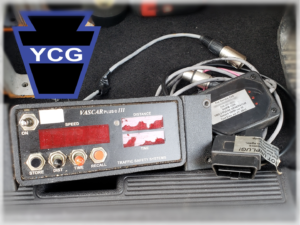We recently read in a Police Upfitter Guide from one of the police vehicle manufacturer’s the following:
CAUTION: Do not connect a radar unit or any other police equipment to the vehicle’s diagnostic connector (OBD-II connector) or the vehicle operating CAN bus. These connections are designed only for authorized service tools during vehicle maintenance. Other equipment connected to the vehicle in this manner can induce unexpected faults and/or degraded vehicle performance and will not be covered by the vehicle’s manufacturer warranty.
YCG has tested OBD-II style modules since 2012 after seeing one installed in a Chevy Caprice. We started our testing and quickly noticed that the signal was not consistent between the OBD-II Module and the speed-timing device. The vehicle speed signal from an OBD-II port is a CAN-BUS signal which means it periodically takes a sample reading and may fluctuate as the speed of the vehicle changes. This can cause inconsistency when measuring or calibrating a speed-timing device (VASCAR, Tracker, Radar). After conducting more testing across the variety of police vehicles available, we made a decision that YCG would not certify speed-timing devices in moving mode as we did not see the accuracy required; the certificate we would provide would only show the device tested for use in stationary mode. This cost us several customers, but we ultimately felt it was the right decision.

As the years have passed, we’ve spoken with many officers who have tried to use their speed-timing device that was connected in this manner. Many of them have told us that they are not confident in the readings and accuracy, therefore won’t use it in moving mode. Others tell us that their calibration station provides them a certificate, so it must be accurate. We at YCG do not agree based on our years, and variety, of testing.
We’ve raised our questions and concerns for many years; how can a module be used when the state requires accuracy of +/- 1% and speed-timing device manufacturers require accuracy of +/- 1/4 of 1% and +/- 1/2 of 1%? We have letters from police departments expressing their concern over the accuracy and others that are willing to share their experiences if desired. We’ve shared our concerns with authorities but we were told that much of the speed-timing decisions fall to the integrity and competence of the PA-approved speed-testing inspection station and PA-approved technician.
So, why would an OBD-II module be used in a police vehicle if a manufacturer specifically says not to? We know that it’s not due to the fact that other wiring options are not available and it’s not due to the fact that the vehicle is lacking a suitable vehicle speed signal….. so, why? I’ll leave that for you to decide.
YCG has always and will continue to lead by example in this industry because we know and understand what’s at stake. We will continue to work for our customer’s best interest and the interest of the public.
Our mission from the beginning has been and remains:
To serve: our customers with the highest degree of excellence and integrity.
To provide: the best possible service, equipment, and training available.
To remain: focused on the ever-changing technology that will affect our customers.
To harness: technology and bring it to our customers in the form of new products and services.
Thank you for your support and patronage; be safe and be accurate!
~ Jake Cowden, Operations Manager
